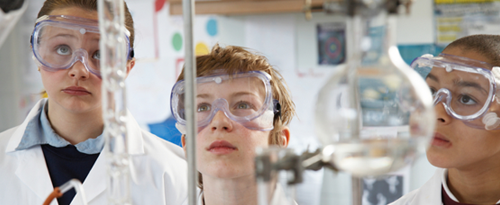Will we get the equipment out?
The debate about the role of practical work in the revised GCSE specifications rumbles on. Draft specifications are now circulating and details of the various investigations required by the different awarding organisations are being revealed. These are unlikely to cause many great surprises – there’s an obvious disincentive for exam boards to require activities that are unusual or require major expenditure.
There are two questions that follow hard on the heels of this though – will schools actually do the practical activities and will students make better progress if they do? Looking at the stipulated practicals in isolation doesn’t really enable us to answer this; one of the things that will impact on how much time gets devoted to practical activities is the amount of content in the course overall – looking at the draft submissions this is not insignificant. Teachers are not going to have oodles of time to do lots of experiments.
A key driver in this is, of course, the impact of practical work on progress. Teachers get to be good at sussing out whether activities are worth doing. If students do no better (or no worse) in final exams depending upon whether they’ve done the experiments, it may not be easy to persuade teachers to devote any more than the minimum amount of time to this aspect.
Obviously a key driver will be the phrasing of exam questions. If items are produced that could be answered as easily whether or not the associated practical activity has been done it may not be easy to justify the time to get the equipment out. Remember however that awarding organisations have form in this area – IGCSEs and their equivalents have for some years now included questions that assess enquiry skills without the use of coursework. A recent presentation for the ASE from Paul Clark, an examiner with Edexcel, gave some insights into this.
Take for example a question on calculating pressure exerted from force and area. Will students be able to answer that question better if they’ve weighed themselves and measured their contact area with the ground, then substituting those values into the formula? It may be that giggling over weighing themselves in Newtons or struggling to count tiny squares within the outline of their slightly sweaty footprint is what will help to retain that formula.
However, consider a different type of question. If students were asked about a ball bearing descending through oil and reaching terminal velocity and were then asked to design an experiment to gather such data, this would be more challenging if they weren’t fairly familiar with the use of a range of equipment. In the pressure question an experiment is only one way of getting students familiar with the calculation but when students actually handle equipment they learn other things such as proportion, scale and a sense of number and for some types of questions this is key.
Another example was a question on the effect of caffeine on the heart rate of daphnia, which included asking candidates about reliability. I think it’s pretty difficult to engage students in considering such aspects of enquiry other than in the context of an actual investigation.
We need to be clear though, about how practical work supports effective learning. It can’t just be a vague notion that ‘doing more practicals develops a better grasp of Working Scientifically’ – as if students will acquire proficiency by osmosis (“he was in the room at the same time as the equipment was out – why can’t he answer the question?”) Following lots of recipe cards doesn’t prepare you to evaluate a procedure. If the Head stopped you in the corridor and asked you to justify why the science department still needed to spend money on practical work now that Controlled Assessments were going, could you give them a snappy and convincing answer?
Ed Walsh



